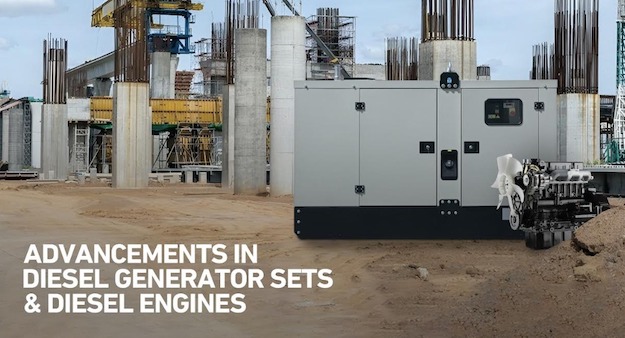The Industrial Revolution stands out as one of the landmark events in the history of human evolution. Steam engines were the predominant option for power generation during this period, up until one man challenged that notion. In 1885, Rudolph Diesel set up his first shop in Paris to begin the development of a compression diesel ignition engine. Since then, diesel engines have emerged as the preferred source of power generation for industrial needs.
Among the many applications of diesel engines, one of them is powering industrial diesel generators. It was Michael Faraday who contributed greatly to the understanding of electromagnetism. This theory eventually led to the invention of diesel engine gensets.
In the past century, we have seen both diesel engines and gensets evolve by leaps and bounds. In this article, we will be talking about how drastically and radically they have improved. Let us first learn about the evolution of diesel engines.
Evolution of Diesel Engines
Fuel Injection Technology
In the early days, a mechanical pump was used to push diesel fuel into the engine cylinders. The pump was controlled by the engine’s rotation. One of the major drawbacks of this system was that fuel injection was imprecise. As time went by, computers stepped in. Sensors were used to measure engine conditions like speed and temperature. This led to a more precise injection, better fuel economy, and less pollution.
After that, came the CRDI (Common Rail Direct Injection), where the fuel was stored in a common rail under high pressure. Currently, piezo injectors are used which open and close in milliseconds. This allows for highly precise injection at different pressures.
Turbo Charging and Super Charging
Turbochargers use exhaust gases to spin a turbine, which in turn rotates a compressor. The compressor forces more air into the engine. In earlier times, turbochargers were bulky and slow to respond. With advancements in technology, they got smaller, faster, and more efficient, making them a common feature in diesel engines. Currently, the trend is towards smaller, and more efficient turbochargers with variable geometry (VGT).
In contrast to this, superchargers are powered by the engine’s crankshaft. In earlier times, they were used mostly in petrol engines. However, with time, they are becoming more common in diesel engines, especially for smaller and lighter vehicles. In the future, we might see superchargers used in conjunction with turbochargers.
Emission Control Technologies
Since their invention, diesel engines have been notorious for producing black smoke during their operation. However, with time, several modifications and advancements have taken place. One of them is Selective Catalytic Reduction(SCR). In this system, Urea is injected into the exhaust system. This urea reacts with Nox, converting it into harmless nitrogen and water. Nowadays, diesel engines produce significantly fewer emissions, making them cleaner and environmentally friendly.
Evolution of Diesel Gensets
Just like diesel engines, diesel gensets have seen several developments over the years. Some of them are mentioned as under.
Digital Control Systems
The control panel used in industrial diesel generators can be categorized into two types: analog and digital. Conventionally, analog systems were used. While they were simple to operate and their maintenance costs were low, they were not accurate. As time went by, digital control systems came to the fore and have replaced analog ones. Digital control systems use binary codes (0s and 1s) to represent data. They are more precise, adaptable, and can handle complex tasks.
Hybrid and Intelligent Generators
One of the most significant trends reshaping the realm of the commercial diesel generators market is the integration of diesel engines with renewable energy sources to create hybrid generators. This approach addresses the growing focus on sustainable and eco-friendly power solutions and enhances the efficiency and reliability of power generation systems. Unlike conventional diesel engine gensets that run solely on diesel, hybrid generators combine diesel engines with solar or wind power.
Thermal Storage Technology
Thermal storage technology is an exciting future innovation for diesel engine gensets. This technology allows for the storage of heat generated during engine operation and using it later to generate electricity with diesel fuel. This technology will enhance the efficiency of the engine and reduce fuel consumption.
Robotics And Artificial Intelligence
We may see the involvement of robotics and artificial intelligence in the maintenance and fault diagnosis of commercial diesel generators. Robots will be programmed to perform maintenance and repair operations on these generators with immense accuracy and effectiveness.
Compact and Portable Gensets
With advancements in technology, the size and dimensions of diesel engine gensets have seen rapid improvements. Compact generators offer flexibility and convenience of easy transportation and installation, making them ideal for temporary power needs.
We hope this article helped you get know-how of how diesel engines and gensets have evolved with time. The future seems extremely bright and promises even more innovative solutions. In the coming years, we can expect to see further advancements in fuel efficiency and emission control, making industrial diesel generators a vital part of the energy realm.

